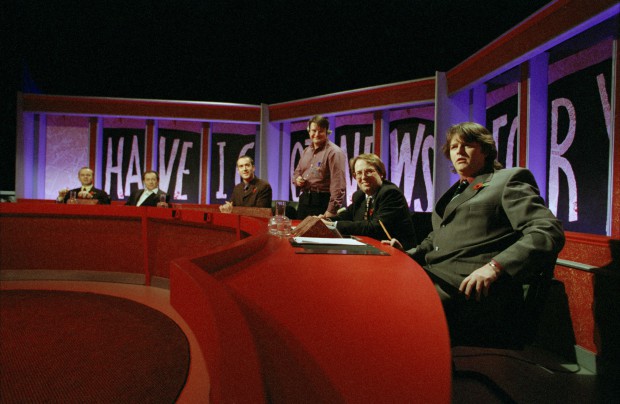America, we’re told, has been enjoying a golden age of news satire. This is largely attributed to Jon Stewart and The Daily Show, less largely to the show that followed it on Comedy Central, The Colbert Report, hosted by Stephen Colbert. The two shows developed a unique rivalry: Colbert the showman to Stewart’s slightly more dour news anchor. It was a rare pairing in which two shows worked as a double act. Often the jokes of one show continued into the next, the hosts appearing in each other’s studio on a regular basis. They worked beautifully together.
Yet beyond Comedy Central, American satire had already been doing well. For decades, Bill Maher has been hosting shows that have been harder, meaner, and often funnier than his mainstream rivals. If Stewart and Colbert gently-to-moderately pokes the political establishment, Maher begins at savage and then digs into filthier dirt. Maher is really the godfather of American political satire and tonally, at least, John Oliver’s new HBO show really owes more to him than it does to Stewart. Last Week Tonight With John Oliver is foul mouthed, scabrous, sometimes wickedly offensive, but also achingly funny.
A sign of the strength of news satire on American TV is that it takes two paragraphs to even partially describe the landscape. About the UK, we can be more succinct.
Have I Got News For You returns this Friday for its 50th series.
The contrast between the two countries couldn’t be more stark. American satirists stare down the camera five nights a week and address the nation and its leaders with a directed anger. In the UK, we have the familiar 2×2 panel show format, in which a very familiar line up of guests throw mild putdowns across the stage. American satire is about satirists speaking to nation, one among equals. In the UK, it can feel like an insular establishment talking among themselves.
It’s why the UK’s news satire can look perfunctory, to say the least. On the night after David Cameron won the recent election, HIGNFY spent most of the show mocking Labour. Twenty-eight jokes were at Labour’s expense. Twenty-three were about the Lib Dems. Seven about UKIP. About the Conservatives, the party in power and surely the proper target for satire, a derisory nine quips.
As a self-confessed fan, it disappoints me. I wait for those moments when Ian Hislop turns to the audience and indignantly lectures them on some point. That’s the show I really want to see on TV: a serious and vitriolic nightly news show. The fabricated quiz show is too weak a format for the serious business of satire. While entertaining and often funny, rarely does HIGNFY feel part of a national debate. Though admirable, longevity is rarely a virtue of good satire. Brass Eye ran for seven episodes, causing more merry hell during that time than HIGNFY has caused in 25 years. Longevity can imply toothlessness or, worse, becoming part of the establishment.
While we in the UK wait for our next golden age to begin (the last being the 1960s), America’s golden age of satire might well be at an end. The Daily Show triumphed at the Emmys but it was a sentimental victory. No serious watcher of satire could argue that The Daily Show had stronger writing than the debut seasons of Last Week Tonight With John Oliver. In recent years, The Daily Show has noticeably traded wit for vulgarity, which made this week’s show, the first hosted by Trevor Noah, seem sadly familiar with Noah reaching his first low point making a tired joke about the size of the Pope’s penis. The challenge The Daily Show now faces is possibly existential, especially if it falls into a familiar pattern.
Meanwhile, it says much about satire in the UK that John Oliver had to travel to America to achieve fame. Meanwhile, The Bugle, the long running podcast he’s been making with Andy Zaltzman, has been mysteriously quiet of late. Personally, I’d have happily traded a 50th season of HIGNFY for a premier season of The Bugle on the BBC.






Comments